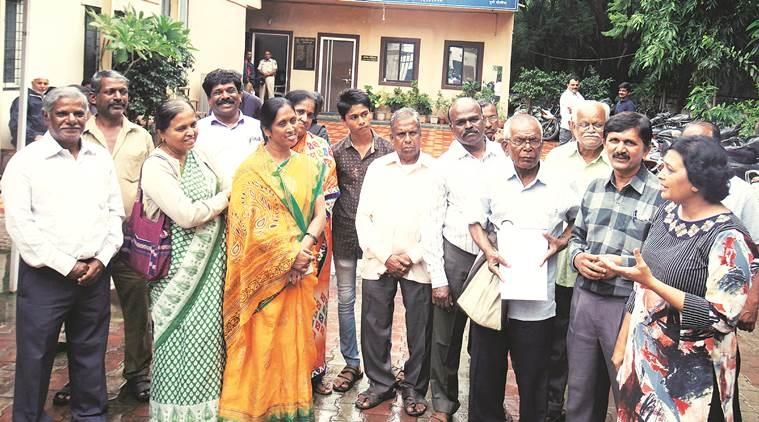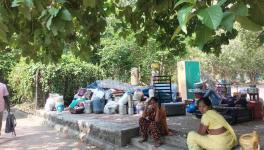Woman Declared Public Property By Caste Council For Lodging FIR Against Husband

Image Coutesy: The Indian Express
Pune: A 31-year-old woman was declared community property by her caste council as punishment for lodged a police complaint accusing her husband of domestic violence.
Belonging to the Vaidu tribe, one of the nomadic tribes in Maharashtra, the married woman was given the status of property of the community by Vaidu caste council or the Jat Panchayat at their meeting held at Junnar in Pune district in the first week of February.
By lodging the FIR with the police against her husband, the woman apparently went against the caste tradition that all problems be solved before the caste council.
Her family was also socially boycotted by the caste council, so all members of the tribe stopped talking to the family, inviting them for functions or even for last rituals. The victim has two sisters, both of whose marriages had been fixed. But once the family was boycotted, families of the respective grooms called off the impending weddings.
Read More: Death of a Rationalist Crusader
Caste councils, generally known as Jat Panchayat, operate as extra-judicial bodies that govern their respective tribes or castes. If members of respective caste/tribes have disputes among themselves, they go to the caste council and not to the legal judicial system, that is, police or court. These tribes have their own traditions, cultures and rituals that are often regressive. If members do not follow these traditions, panches/judges of these councils give punishment to offenders. Socially boycotting the family of the offender is considered the most heinous punishment.
Although Maharashtra has implemented the Maharashtra Prohibition of People from Social Boycott (Prevention, Prohibition and Redressal) Act, 2016, the implementation of the act has remained poor and caste councils of many tribes continue to rule.
Vaidu is one of the nomadic tribes in Maharashtra, with a population of approximately over six lakh in the state. Traditionally, the tribe would sell traditional medicines at tents put up outside villages, although these medicines are not clinically or legally approved. Many families currently sell stationary, jewellery or cutlery by going house-to-house. They are still nomadic and remain poor. Although kids from the current generation of the tribe ususally go to school, they tend to drop out by high school or college due to poverty or because their families keep migrating.
In this case, Savita Shivarkar (name changed), 31, got married ten years ago. Her husband sells cutlery by going to various villages in Jalna. She had lodged an FIR against her husband a few years ago and she was pursuing the case in regular court. The woman stays with her parents at Buldhana district of Maharashtra. In 2016, her husband got married to another woman.
Chanadan Lokhande, a social activist from the Vaidu tribe, said, “Suddenly on 22 January, 2019, a caste council meeting of Vaidus was held at Jejuri, a village near Pune. Apart from panch/judge Tatya Shivarkar, over 50 members of the caste were present at the meeting. And the judges said this woman was a blot on the tribe as she had gone to police against her husband, so now she is ‘Moghlai Mal’ (an obscene word for public property). The woman’s family was not present at meeting.”
The woman’s father said, “On 31 January, we went to attend a wedding of relatives and they were evicted from the venue. They were removed from all social media groups of the community. And we were told about the events at the caste council meeting held in Jejuri. The worst part is that families of the would-be grooms of my two other daughters, who are aged 19 and 21, have also called off the marriage.”
Lokhande approached the family after he came to know of the incident. The family went to the police to lodge the FIR on 1 February. But police refused to register the FIR, saying this was an internal matter of the tribe community. The police finally lodged an FIR after Lokhande went along with other social activists and reporters.
Read More: Maharashtra has a Long History of Fighting Regressive Ideas – Megha Pansare
Officials from Jamkhed police station in Ahmednagar district of Maharashtra told Newsclick, “The six members of Vaidu Caste Council were booked under various sections of The Maharashtra Prohibition of People from Social Boycott (Prevention, Prohibition and Redressal) Act, 2016. These are Tatya Shivarkar, Anna Godave, Motiram Chavan, Balasaheb Lokhande, Tatya Shinde. While Shinde, Chavan and Lokhande were arrested, they got bail after being produced in court.”
Chanadan Lokhande said, “In this case, the woman has also been molested as she was called caste property in the public meeting where over 50 people were present. But the police were hesitant to add molestation or sexual harassment sections in the FIR she has lodged against the caste council. That section has still not been invoked in the FIR.”
Krishna Chandgude, who leads the campaign against caste councils with the Maharashtra Andhashradha Nirmulan Samiti (MANS) — founded by Dr Narendra Dabholkar — a rationalist and anti-superstitution crusader, said:
“Many caste councils have dissolved themselves after the Act came into effect. But a few like the Vaidu are stubborn. We had a meeting with Home Minister of State Ranjit Patil last week, asking how the act could be implemented more effectively. Police need to be trained for this Act.”
Its because of MANS’s relentless efforts that the state government had passed this Act in 2016.
Read More: The Significance of a Scientific Outlook
Get the latest reports & analysis with people's perspective on Protests, movements & deep analytical videos, discussions of the current affairs in your Telegram app. Subscribe to NewsClick's Telegram channel & get Real-Time updates on stories, as they get published on our website.
























